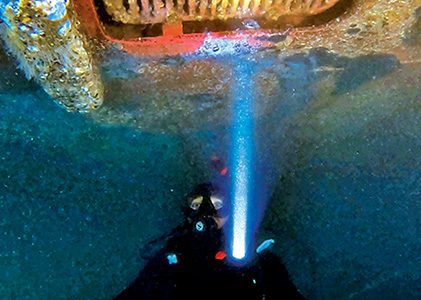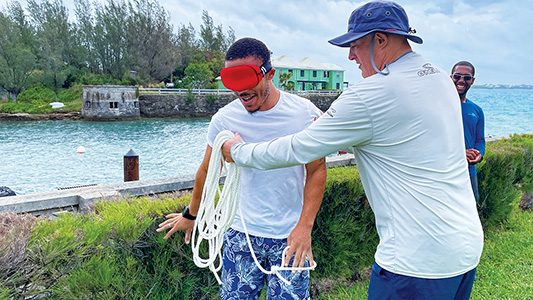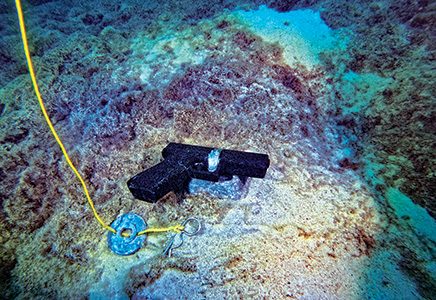In February 2020 the Royal Bermuda Regiment launched Bermuda’s first coast guard unit, responsible for enforcing maritime law in its waters and providing around-the-clock search-and-rescue capabilities.
The regiment’s coast guard unit has a team of skilled divers who have served their community on numerous missions over the past few years, including recovering bodies, evidence, and submerged vehicles and conducting underwater hull searches of ships in the island’s harbors. An increase in the number of dive operations since the unit’s inception led them to pursue additional training in late 2023 to expand on their previous education and increase their capabilities.
The mindset, skills, and practical knowledge required by a public safety dive team operating in a dual military and law enforcement capacity differ vastly from recreational, technical, and commercial diving disciplines. Unable to find the necessary specialized expertise on the island, the regiment teamed up with local dive instructor Sam Bennett to bring in professionals and fresh perspectives from the United States. Emergency Response Diving International (ERDI) instructor trainer Thomas Powell and ERDI instructor Aaron Bradshaw, both experienced and active public safety divers, flew in from North Carolina.
“One of our goals was to bring the team’s three recreational instructors up to speed so they could teach ERDI courses,” Powell said, “ensuring they’re equipped to develop educational programs and plan in-service training that’s designed to reinforce or supplement the education the team already received during certification training.”
Training on the island kicked off as planned. Divers completed a series of strenuous fitness and water skills tests, listened to classroom presentations of case studies extracted from actual calls, and jumped into the water to practice a series of back-to-basics dive skills.
Midway through the week, however, plans changed. Bermuda officials received intelligence suggesting an approaching vessel was smuggling drugs. The team had to embrace the unexpected and put their training to work.



Searching the MV Suhar
The morning began with a briefing, but it wasn’t a skill briefing this time. Officials believed the MV Suhar, a cement carrier registered in Panama, was involved in parasite smuggling — a tactic traffickers use to hide narcotics on unsuspecting ships, which often involves divers strapping containers of drugs to a ship’s hull.
A team of police and customs officers would board the vessel and execute a search warrant, and they needed coast guard divers to search the hull. The divers planned to investigate the hull from the waterline to keel one side at a time. One diver would stay at the surface, holding the end of a thick line, while the remaining divers would distribute themselves along the line under the hull.
The line would also be a communication tool for divers to use line tugs as command signals, which is standard practice for this type of diving. The team practiced their search technique and line-pull communication on land until everyone felt confident.
A few hours later, divers descended along the ship’s bow with line in hand. The water was a mucky, hazy green, and dark brown sediment from the harbor floor formed an ominous silty cloud around the ship, rendering it nearly impossible to see the Suhar from more than 3 feet (1 meter) away. It’s a massive vessel with a mostly flat hull and no defined keel, which complicated the dive plan. In some areas below the ship it was impossible to see daylight and know where the surface was, making it easy for divers to become disoriented if they lost contact with the line.
Divers felt along the hull’s surface with gloved hands, communicating stop and go with line pulls. Midway down the ship, the divers’ lights revealed something protruding from the otherwise flat hull. The team stopped to investigate and found several large pieces of zinc attached around one of the vessel’s intakes to prevent corrosion. A diver closely examined the zinc and the grate over the intake before signaling the team to move forward.
They reached the stern 30 minutes later and conducted a preliminary rudder and propeller search before surfacing to discuss findings and adjust the plan. Surface support diligently checked on the divers, ensuring everyone was accounted for and had sufficient breathing gas to proceed with a second dive. They descended into darkness again, slowly working their way toward the bow.
While they concluded their search without finding anything out of the ordinary, the operation was a unique opportunity for the visiting instructors to see the divers in action. The team trained with full-face masks equipped with underwater communication systems later in the week. They also experimented with different ways to carry redundant gas sources and learned how to use sonar to aid in body recovery. The operation highlighted the importance of specialized training, continuing education, and rigorous practice for public safety divers.
Getting Outside the Classroom
Experience builds competency and intuition, which aid in safe and effective execution, but real operations are unpredictable. One of the best ways to prepare for that unpredictability is with simulated dive missions strategically crafted to meet a team’s current needs.
The regiment’s new ERDI instructors — J.D. Symonds, Forrest Williams, and Nathan Frick — concocted a series of realistic scenarios as part of their evaluation. They had role players act as witnesses and bystanders and assigned divers different roles throughout the simulations, so even the team’s newest divers had a chance to lead an operation.
The scenarios grew increasingly complex, emphasizing the unpredictable nature of public safety dive operations while testing the team’s responses under pressure. Watching the group respond allowed the instructors to see how they controlled the scene and how they reacted to a significant distraction, such as a panicked bystander in the water. The team debriefed between scenarios, just as they would after real situations.
Practicing scenarios enable dive teams to maintain their readiness to respond when needed. The Royal Bermuda Regiment Coast Guard will continue running through scenarios during their in-service training.


Looking Forward
The MV Suhar search occurred after several high-value drug raids by Bermudian officials. Police and customs officers had seized narcotics worth millions of dollars in the months prior and made multiple arrests in the process.
As officials work to keep drugs off Bermuda streets, the regiment is equipped to support such operations in the water. The new ERDI instructors enable the team to train public safety divers in-house, and they are already planning additional training and acquiring tools to expand their capabilities based on their community’s needs.
Scuba diving has a magical way of bringing together folks across the globe and forming deep bonds through working in the industry or simply enjoying the sport. The partnership between the Royal Bermuda Regiment Coast Guard and U.S. dive instructors is an example of how strengthening relationships between countries doesn’t need to be a political affair when diving is involved.
© Alert Diver — Q1 2024